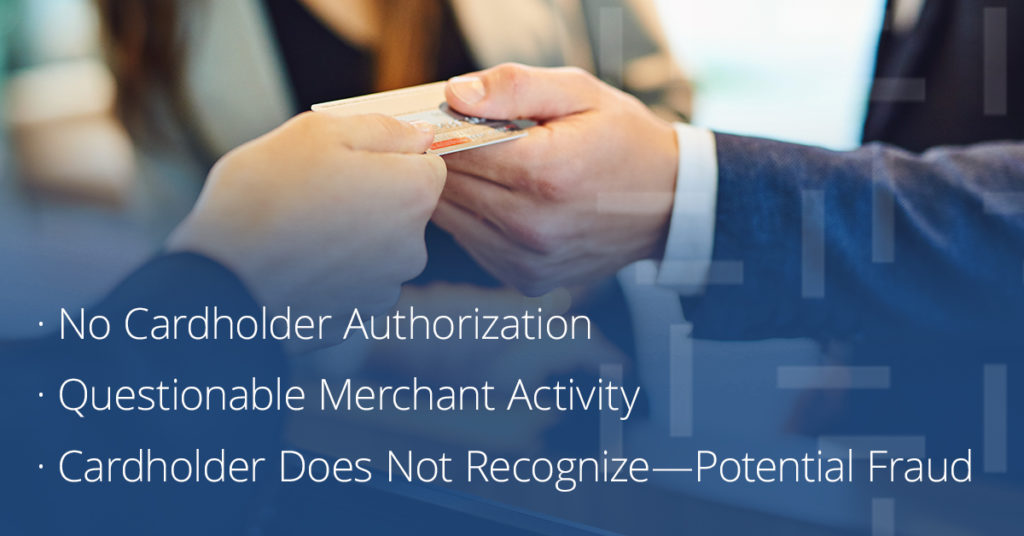Can we talk about “chargebacks?” When a cardholder contacts a financial institution about a non-authorized transaction, it’s called a “dispute.” A dispute triggers a multi-step (and very costly) back-office procedure referred to as a “chargeback.” Your processor charges as much as $35 for this chargeback to inform you that the merchant denied the refund for which you already likely credited the cardholder. Insult meet injury.
Chargebacks were designed to protect users from unfair merchant practices and identity theft, but they’re increasingly being misused by consumers. This misuse is known as “friendly fraud.”
Dispute, as a noun, is defined as a disagreement, argument or debate. Is this how your staff is handling the dispute interaction? Is there any debate about the facts of the transaction or is the cardholder automatically credited the purchase amount, the chargeback processed, and the amount eventually written off to the “Losses” GL? It’s important to know that Reg E does not restrict conversations, questions or gentle pushback on the cardholder.
Friendly Fraud
Inaccurate disputes are sometimes innocent errors. For instance, cardholders may file disputes if they see transactions on their statements from merchants they do not recognize because the billing descriptor name on the posted transaction does not match the storefront name on the business. Many convenience stores and gas stations feature this discrepancy in merchant name. However, many disputes are friendly fraud, which occurs when cardholders dispute legitimate charges with their financial institutions rather than trying to obtain refunds directly from merchants. Consumers may have buyer’s remorse, wait too long to initiate a return or neglect to cancel an online subscription service after a free trial. They can then present it to the financial institution and say, “I did not make this transaction,” “I never received delivery of this order” or “I didn’t sign up for this service.”
What if I charge an expensive seafood dinner, but I really hated my scallops? Theoretically, I can call my Financial Institution the next day and tell them I see a transaction on my account I didn’t initiate. My Financial Institution will then credit the transaction to my account and process a chargeback dispute. The Financial Institution may close my card and issue a new one, due to the unauthorized use, but many customers are not as bothered by this process as you think. Many cardholders abuse their financial institutions by claiming they didn’t make a purchase, knowing they will likely receive a full refund for little effort and keep the merchandise, experience or … the scallops.
If you review your dispute recovery percentage, you’re likely to discover it’s quite low. Merchants are investing in processes to ensure friendly fraud is your loss, not theirs. They have many ways to produce “compelling evidence” that your cardholder did, in fact, authorize the purchase, which include:
- Delivery confirmation receipt email – from UPS, USPS, FedEx, etc.
- Photograph of the package on the porch. Loss of merchandise by a porch pirate is not a dispute, it’s an unfortunate circumstance.
- Contract – hello, VRBO disputes!
- Sales receipt. Even without a signature, it has a date/time stamp.
The type of document isn’t as important as its function. Issuers must be able to determine the validity of the transaction based on whatever document the merchant chooses to share as compelling evidence.
Friendly Fraud vs. True Fraud
The primary difference between friendly fraud and true fraud lies in the identity of the fraudster. True fraud, also known as identity theft, starts with a card stolen, compromised or skimmed from the authorized user. Once the theft is discovered, the card is closed, and a new card issued. This situation is truly no fault of the cardholder and is why Reg E was initiated back in the 1970s. But consumers use their cards much differently now than in the 1970s, including for transactions with online merchants that are even more prone to “disputes.”
Mastercard and Visa 3D Secure 2.0
By now you have likely experienced a chargeback dispute denied due to “3D Secure verified.” Snap! It’s likely friendly fraud. Mastercard and Visa have an improved process that both merchants and issuers participate in, which verifies the purchase is authorized based on 10 times more data than the previous version. Data points such as device biometrics, device channel, IP Address and order history avoid the need for every shopper to actively authenticate with a password.
When 3-D Secure is used during a transaction, that sale is not eligible for a chargeback involving any of the following reason codes:

So, if your customer is pushing back on a 3D Secure verified transaction, make sure that you’re asking all the right questions.
In 2019, it was reported by Payment Source that the financial impact of friendly fraud increases by an average of 41 percent every two years, now representing between 60 and 80 percent of all disputes.
In conclusion, three things to consider:
- Review front-line procedures for accepting disputes without conversation and questions with cardholder.
- Ensure any time a dispute is accepted that is not a true merchant error/failure, the cardholder is required to have the card reissued.
- Consider tracking fraudulent use losses separate from dispute refunds.
Profit Resources specializes in identifying profitability improvement areas for financial institutions through revenue growth, cost control, streamlining processes, and effective use of technology. Contact us to learn more about our personalized approach to strategic planning to propel growth and improve profitability.

Infographic by- Invesp Conversion Rate and Landing Page Optimization
Other Recent Articles
- Maximizing System Utilization: Harnessing the Potential of Reporting Systems
- Maximizing System Utilization: Understanding Parameters and Capabilities
- Community Banking Month: Competing Banks Partner to Rebuild the Community
- Community Banking Month: Sovereign Bank’s People-First Approach to Building Stronger Communities
- Maximizing System Utilization: Ditch Paper and Manual Processes
- Are Good Vendor Partnerships Leading You to Bad Ones?
